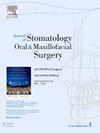自身免疫是否与口腔癌前病变的发展及口腔鳞状细胞癌的进展有关?文献综述。
IF 1.8
3区 医学
Q2 DENTISTRY, ORAL SURGERY & MEDICINE
Journal of Stomatology Oral and Maxillofacial Surgery
Pub Date : 2024-11-17
DOI:10.1016/j.jormas.2024.102139
引用次数: 0
摘要
目的:口腔潜在恶性疾病(OPMD)是一种可能发展为口腔鳞状细胞癌(OSCC)的口腔黏膜疾病。虽然自身免疫与各种癌前病变的恶性转化潜能有关,但其在口腔潜在恶性疾病中的作用仍不明确。本综述旨在确定系统性自身免疫对OPMD发展及其向OSCC进展的作用:方法:使用PubMed、Cochrane CENTRAL和SCOPUS数据库对截至2024年1月发表的文章进行了全面的文献检索。本综述探讨的关键问题是 "自身免疫是否与OPMD的发展有关 "以及 "全身性自身免疫如何影响OPMD恶性转化的可能性?本综述遵循了PRISMA范围界定综述指南(PRISMA-ScR):在初步确定的 1265 篇文章中,有 21 篇符合检索标准。结果:在最初确定的 1265 篇文章中,有 21 篇符合检索标准,其中有三个主题:1)全身性自身免疫性疾病患者口腔癌的发病率和预后;2)OPMD 患者的循环自身抗体;3)与 OPMD 患者恶性转化相关的自身免疫相关标记物。这篇综述指出,系统性自身免疫可能会导致慢性炎症、口腔黏膜完整性受到破坏、DNA损伤修复过程受到干扰,从而影响OPMD患者口腔上皮的恶性转化:结论:OPMD与循环自身抗体或全身自身免疫性疾病同时存在,这突显了了解这些相互作用对于改善OPMD的管理和早期发现OSCC的重要性。本文章由计算机程序翻译,如有差异,请以英文原文为准。
Is autoimmunity associated with the development of premalignant oral conditions and the progression to oral squamous cell carcinoma?: A literature review
Objective
Oral potentially malignant disorders (OPMDs) are oral mucosal conditions that may progress to oral squamous cell carcinoma (OSCC). Although autoimmunity has linked to the malignant transformation potential of various precancerous conditions, its role in OPMD remains unclear. This review aimed to identify the role of systemic autoimmunity on OPMD development and their progression to OSCC.
Methods
A comprehensive literature search was conducted using PubMed, Cochrane CENTRAL, and SCOPUS database for articles published up to January 2024. The key questions addressed by this review were “Is autoimmunity associated with the development of OPMD” and “How does systemic autoimmunity influence the potential for malignant transformation of OPMD?”. This review followed the PRISMA guidelines for scoping reviews (PRISMA-ScR).
Results
Of the 1265 articles initially identified, 21 fulfilled the search criteria. Three themes were emerged; 1) the prevalence and prognosis of oral cancers in patients with systemic autoimmune diseases, 2) circulating autoantibodies in OPMD patients, and 3) autoimmune-related markers linked to malignant transformation in OPMD patients. This review indicated that systemic autoimmunity may contribute to chronic inflammatory conditions, disruption of oral mucosal integrity, and interference with the DNA damage repair process, thus influencing malignant transformation in the oral epithelium of patients with OPMD.
Conclusion
The co-occurrence of OPMD with circulating autoantibodies or systemic autoimmune diseases underscores the importance of understanding these interactions for improved management of OPMD and early detection of OSCC.
求助全文
通过发布文献求助,成功后即可免费获取论文全文。
去求助
来源期刊

Journal of Stomatology Oral and Maxillofacial Surgery
Surgery, Dentistry, Oral Surgery and Medicine, Otorhinolaryngology and Facial Plastic Surgery
CiteScore
2.30
自引率
9.10%
发文量
0
审稿时长
23 days
 求助内容:
求助内容: 应助结果提醒方式:
应助结果提醒方式:


